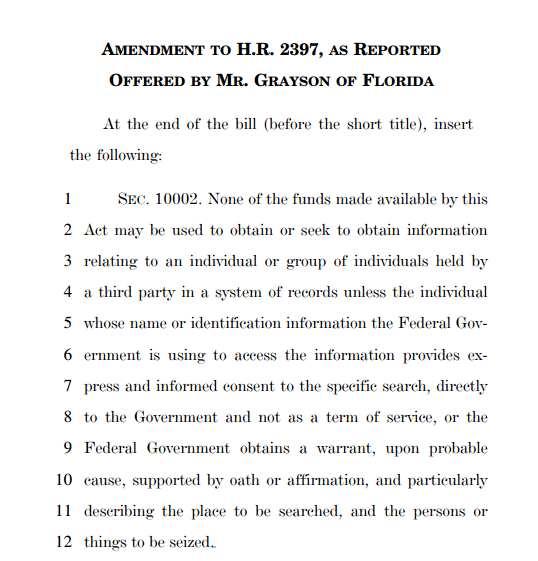Cross posted from The Stars Hollow Gazette
One of the many provisions of the National Defense Authorization Act of 2013 that was signed by Pres. Barack Obama late in the night of December 30, 2012, was the repeal of the Smith-Mundt Act of 1948. The original act outlined the State Department’s dissemination of information outside the boarders of the United States:
authorizes the U.S. State Department to communicate to audiences outside of the borders of the United States through broadcasting, face-to-face contacts, exchanges (including educational, cultural, and technical), online activities, the publishing of books, magazines, and other media of communication and engagement.
The legislation included three key provision the first, and most important was a prohibition on domestic dissemination of materials intended for foreign audiences by the State Department.
Section 501(a) of the Act (care of the Voice of America website) provides that
“information produced by VOA for audiences outside the United States shall not be disseminated within the United States … but, on request, shall be available in the English language at VOA, at all reasonable times following its release as information abroad, for examination only by representatives of United States press associations, newspapers, magazines, radio systems, and stations, and by research students and scholars, and, on request, shall be made available for examination only to Members of Congress.”
“This means that VOA is forbidden to broadcast within the United States.” In reality, of course, any American with a shortwave receiver or an Internet connection can listen to VOA. That’s incidental, however. VOA cannot direct or intend its programs to be “for” Americans. This distinction is often lost on experts who see the letter of the law but with no real understanding of the media. George W. Bush-era State Department official James K. Glassman has called for directing VOA at American audiences.
The 2013 NDAA ended that restriction on July 2:
(T)he Broadcasting Board of Governors (BBG) was given permission to let US households tune-in to hear the type of programming that has previously only been allowed in outside nations.
The BBG is the independent government agency that broadcasts Voice of America, Radio Free Europe, and other networks created “to inform, engage and connect people around the world in support of freedom and democracy” – and a new law now allows the agency to provide members of the American public with program materials originally meant to be disseminated abroad.
Back in 1972, Arkansas Senator J. William Fulbright equated those government stories with propaganda when he said they “should be given the opportunity to take their rightful place in the graveyard of Cold War relics.” A couple of current lawmakers were singing a different tune when they proposed the Smith-Mundt Modernization Act of 2012 last year, though, which became official just two weeks ago.
Reps. Mac Thornberry (R-TX) and Adam Smith (D-WA), who introduced the changes to the Smith Mundt last year argued
“Effective strategic communication and public diplomacy should be front-and-center as we work to roll back al-Qaeda’s and other violent extremists’ influence among disaffected opulations,” [..]
“An essential part of our efforts must be a coordinated, comprehensive, adequately resourced plan to counter their radical messages and undermine their recruitment abilities. To do this, Smith-Mundt must be updated to bolster our strategic communications and public diplomacy capacity on all fronts and mediums – especially online.“
According to Tim Cushing at Techdirt, there is the good news and bad news of the government’s ability to aim its pre-approved news at US citizens. The “good new”:
BBG spokesperson Lynne Weil says these efforts aren’t simply pro-government hype machines. [..]
As Weil points out, this will bring a new level of transparency to the BBG as communicating to Americans is no longer prohibited. If nothing else, transcripts of BBG programming will be easier for Americans to get ahold of. A court ruled in 1998 that the limitations of the Smith-Mundt Act exempted the Voice of America from releasing transcripts in response to FOIA requests.
Another possible plus is the fact that the BBG will provide a free, “local” news source for immigrant populations. [..]
However, there is the “bad news”:
(T)he thought of a state-run news agency being allowed to direct its efforts at Americans is still uncomfortable. Despite claims of independence, it’s hard to believe the source is 100% trustworthy when its stated purpose is to run flack for the State Department in foreign nations. (Of course, the mainstream media outlets haven’t shown much reluctance to regurgitate talking points, which almost makes the BBG’s efforts seem redundant.)
While the BBG may provide a less-biased source of news for many foreigners (or at least provide a different bias), the purpose of its broadcasts to its new American audience is less clear. The fact that the State Department is behind the effort doesn’t do much to allay fears that the BBG will become a tool of domestic propaganda. The State Department’s reaction to the leak of diplomatic correspondence by Wikileaks was to block its employees’ access to the site (or any site containing the word “Wikileaks”) and demand the digital documents be “returned.” How will a state-run press react to developments like these? Will it be forced to play by the department’s rules, no matter how illogical, or will it be able to deal with them in a more forthright manner?
In a time where the administration seems to be forced to play defense with increasing frequency, it’s hard to believe it won’t be willing to exploit this addition to its PR arsenal.
In a May 18, 2012 BuzzFeded article, the late Michael Hastings warned that this revision would open the door to Pentagon propaganda:
The evaporation of Smith-Mundt and other provisions to safeguard U.S. citizens against government propaganda campaigns is part of a larger trend within the diplomatic and military establishment.
In December, the Pentagon used software to monitor the Twitter debate over Bradley Manning’s pre-trial hearing; another program being developed by the Pentagon would design software to create “sock puppets” on social media outlets; and, last year, General William Caldwell, deployed an information operations team under his command that had been trained in psychological operations to influence visiting American politicians to Kabul.
A U.S. Army whistleblower, Lieutenant Col. Daniel Davis, noted recently in his scathing 84-page unclassified report on Afghanistan that there remains a strong desire within the defense establishment “to enable Public Affairs officers to influence American public opinion when they deem it necessary to “protect a key friendly center of gravity, to wit US national will,” he wrote, quoting a well-regarded general.
Not only is the government creating an state approved press, it will now have its own news agencies within the US to disseminate its own sanctioned news stories, a true Pravda on the Potomac.



 Welcome to the
Welcome to the 
 The camp, known as “You Are You”, is in its third year. It’s a place where trans kids and their families can gather to network with others in a similar situation. You can see for yourself just how obscene that can be
The camp, known as “You Are You”, is in its third year. It’s a place where trans kids and their families can gather to network with others in a similar situation. You can see for yourself just how obscene that can be 
 On this day in 1848, a two-day
On this day in 1848, a two-day 
